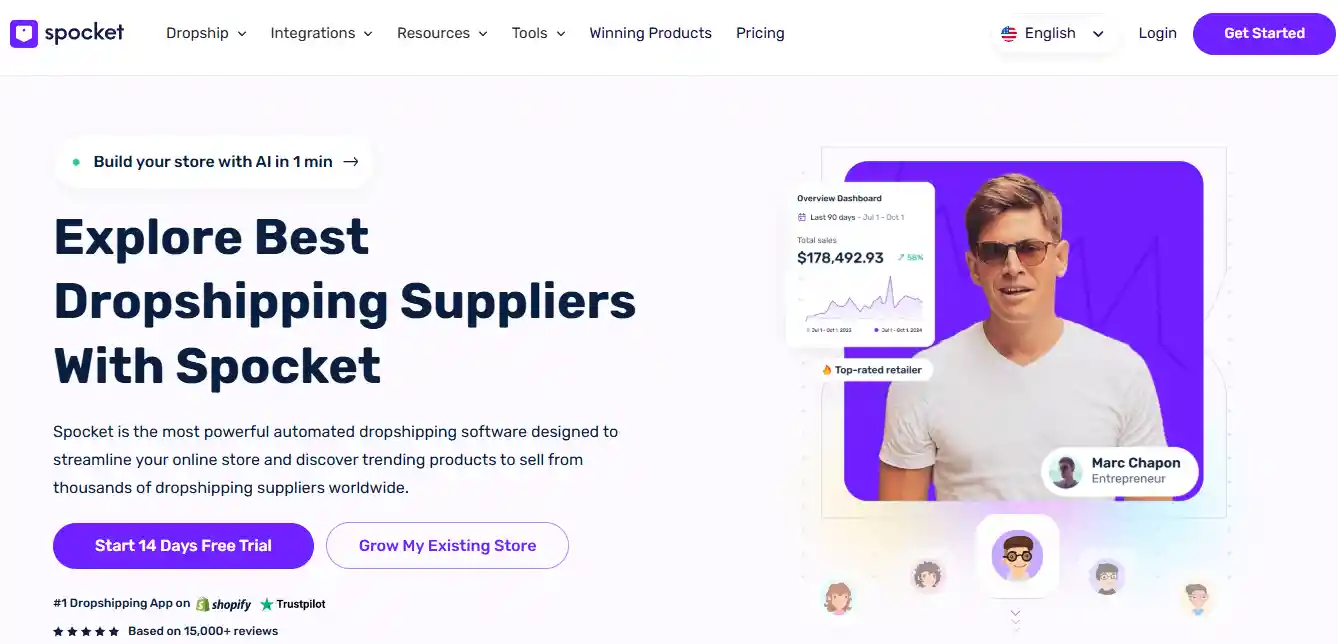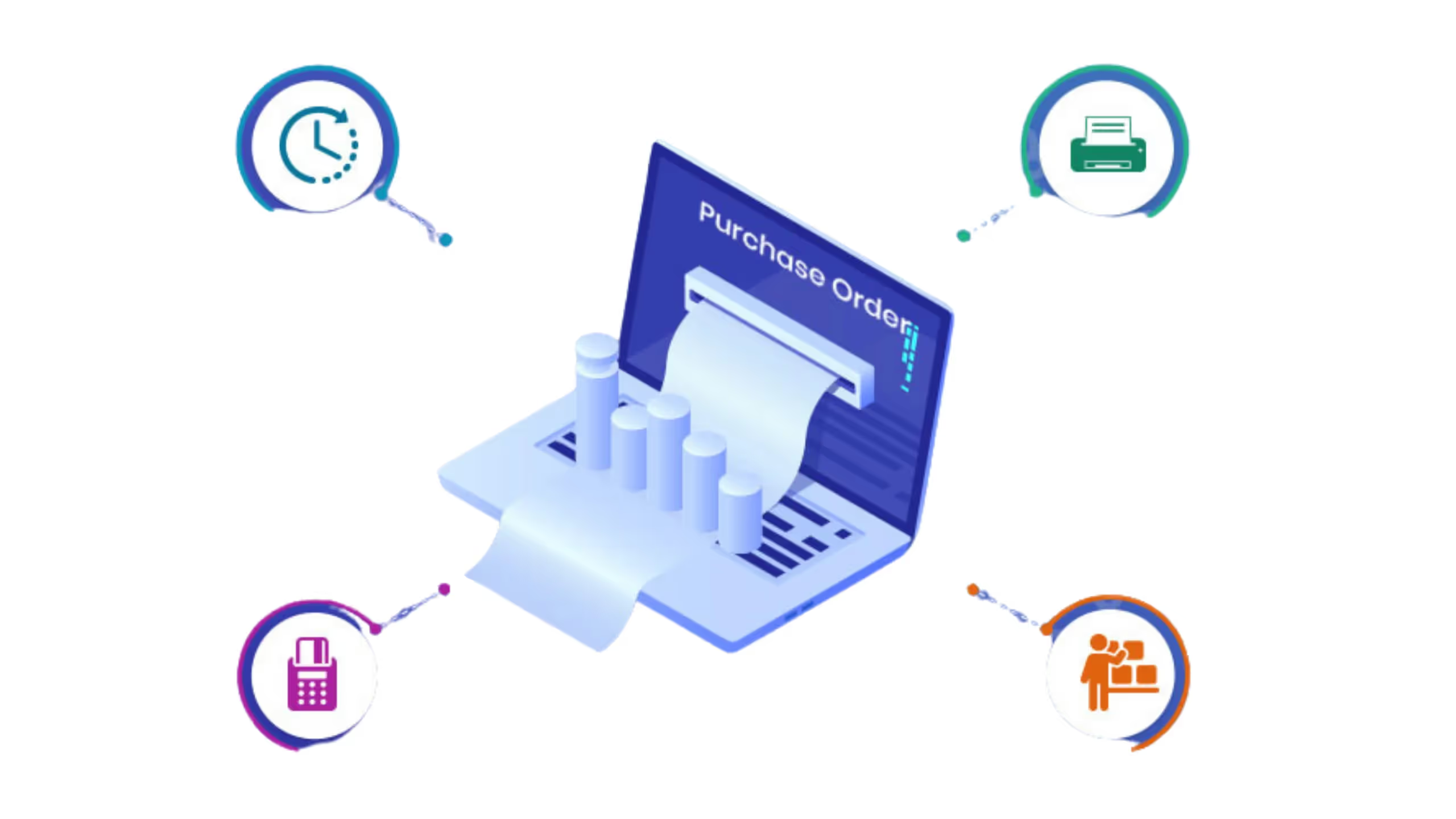Dropshipping Automation Mastery: 7 Tools That Can Help You
Learn how these dropshipping automation tools can boost your business efficiency. Start making more sales and retain clients today.


We have tested tons of dropshipping tools so we know a thing or two about how to boost dropshipping efficiency using automation. Trust us, we’re not newbies.
You need the right tools to manage everything. Miss one piece and everything falls apart like waves hitting a sand castle fast.
Your customers will get annoyed or impressed, depending on the tools you use. Here is everything you want to know about these dropshipping tools, including which ones work and don't.
The Top Tools We Recommend to Boost Dropshipping Efficiency
Here is which tools you want to start using and what we recommend:
1. Dropshipping Website Builders

Building your dropshipping store is the first step. You need a foundation that works. Your website is where customers make purchases, so it needs to function smoothly and look professional. Trying to run a dropshipping business without a solid website builder is like trying to sell without a storefront—possible, but you're missing crucial sales.
Website builders have come a long way. They're no longer just for tech people. Modern builders let you drag and drop your way to a working online store in minutes, not months.
So here are your options:
- Shopify stands out because it was built specifically for selling online. You get an all-in-one platform with payment processing, inventory management, and thousands of apps that connect directly to dropshipping suppliers. Setup takes hours, not weeks. Over 2 million merchants use Shopify across 175 countries, so you know it works. The beauty of Shopify is integration. Inventory updates in real time. Orders process without you lifting a finger. That's automation that actually saves time. Pricing starts at $39 monthly for the basic plan, so you don't need massive capital to start.
- BigCommerce works for stores that want to scale fast. It's enterprise-grade but still user-friendly. Multi-channel selling means you list products on Amazon, eBay, Facebook, and Instagram from one dashboard.
- WooCommerce is the open-source option. It runs on WordPress and gives you complete control over your store. If you want full customization without monthly fees limiting you, WooCommerce works well. The tradeoff is you handle more setup yourself.
- Wix appeals to beginners who want beautiful designs without technical skills. Drag-and-drop templates come ready to customize, and SEO tools are built in. It's not as dropshipping-focused as Shopify, but it gets the job done if you prefer simplicity.
- DropGenius is an AI store generator worth mentioning. It's designed specifically to help you launch stores fast and populate them with trending dropshipping products. If you want your store built and stocked in minutes rather than days, this saves enormous time[query details].
Don't overthink the choice. Pick a builder that feels natural to you, lets you connect suppliers easily, and supports the platforms where your customers shop. You can always switch later if needed.
2. Supplier Sourcing Tools

Finding the right suppliers makes or breaks your business. Bad suppliers mean late shipments, poor quality, angry customers. Good suppliers mean smooth operations, happy customers, repeat business. This is where supplier sourcing tools come in.
Here’s what we recommend:
Spocket
Spocket specializes in connecting dropshippers with vetted US and EU suppliers. That matters because shipping from domestic warehouses cuts delivery times dramatically. Customers get products faster, which reduces refunds and complaints.
Spocket's supplier list is curated, not scraped from random databases. Each supplier is verified. You're not gambling on unknown vendors. They offer over 100 million trending dropshipping products with real sales data behind them. That means products already proved themselves in the market.
The platform handles inventory automatically. When a supplier runs low on stock, it updates across all your connected stores instantly. You can't oversell or disappoint customers by advertising products you don't actually have.
One-click product imports mean you don't spend hours manually adding items. Find a product you want to sell, click import, and it's in your store with descriptions, images, pricing already done. Then you adjust the price to your markup and you're selling[query details].
Inventory Source
Inventory Source connects to 230+ pre-integrated suppliers and works across 25+ e-commerce platforms including Shopify, WooCommerce, BigCommerce, and others. Real-time syncing keeps everything current. Unlike some platforms, they don't add sneaky markups on top of supplier prices, so you know exactly what you're paying.
The 24/7 support matters when you hit issues during your timezone. Suppliers sometimes flake. Platforms sometimes break. Having support available anytime is worth the higher price for serious operators.
Syncee
Syncee pulls suppliers from worldwide networks. Great if you want international options. Their filter system lets you search by warehouse location, shipping type, product category, and more. You can even chat directly with suppliers before committing to work with them.
These tools save the biggest thing dropshippers lack—time. Instead of hunting suppliers manually or trusting random marketplaces, you get vetted options with real data. The convenience is worth the monthly fee alone when you calculate the hours saved.
3. Dropshipping Supplier Directories

Dropshipping supplier directories differ from sourcing tools. Directories are more like catalogs. You browse through listings to find suppliers. Sourcing tools automate the process once you decide. Both have their place.
Try out these dropshipping directories:
- SaleHoo maintains a directory of over 8,000 pre-vetted suppliers grouped by category. Browse categories, compare suppliers, read other merchants' reviews about working with them. It's transparent and thorough.
- Wholesale Central offers free access to a directory of US-based suppliers. Great if you want direct relationships with manufacturers. You deal directly rather than through a middleman, which can mean better pricing if you negotiate well.
- Doba combines directory browsing with automation tools. You research suppliers in their directory, then connect automation to handle syncing and ordering. Flexible approach for merchants who want options.
These directories work best combined with automation tools. Find suppliers you like in the directory, then automate the workflow so you don't have to babysit everything.
4. Order Processing Automation

Once customers start buying, you have two choices. Handle everything manually—every order, every inventory update, every customer notification. Or automate it and reclaim your life. Manual order processing kills dropshipping businesses. You're spending 8 hours daily just fulfilling orders instead of marketing and growing. Automation flips that.
Spocket handles this with one-click order processing. The customer places an order. It automatically sends to your supplier with customer address and details. Your supplier ships directly to the customer. You just collect the profits.
Branded invoicing matters for customer experience. Spocket lets you include your branding on packing slips and invoices so customers feel they're buying from your brand, not a middleman. That small touch builds loyalty[query details].
Many other solutions also automate order routing. When you get an order, they route automatically to the right supplier based on rules you set. Some suppliers ship faster. Some have better products for certain categories. You set the rules once and let automation handle it forever. This frees you to focus on what actually grows businesses—marketing, customer relationships, finding winning products. Not data entry.
5. Marketing and Advertising Automation

You can have the best store and products, but if nobody knows about you, you make no money. Marketing automation helps you reach more people without writing copy daily.
Email marketing automation is the foundation. When someone visits your store but doesn't buy, they get an automated email series. The first email reminds them what they looked at. Second, it offers a discount. Third, tell them why your product solves their problem. Without automation, you send hundreds of manual emails daily and go insane.
Social media automation schedules posts across platforms. Write 30 days of content on Sunday, schedule it, then don't touch social media for a month. The posts go out consistently keeping your business visible.
Retargeting ads show your products to people who visited your store but left. They see ads for your products across Facebook, Instagram, Google while browsing other sites. Constant reminder keeps your store top-of-mind when they're ready to buy.
Most major platforms have built-in automation now. Shopify integrates with Facebook and Instagram. BigCommerce works with Google Shopping. You don't need complicated setups—they're built in.
6. Customer Support Automation

Customer support is critical but expensive. Chat all day with customers or implement automation that answers 70% of questions automatically. Chatbots handle common questions. "What's your shipping time?" "Do you have size XL?" "How do I track my order?" Bots answer these instantly. Real questions requiring human touch get routed to you.
Email automation sends order confirmations, shipping notifications, delivery confirmations automatically. Customers stay informed without you sending manual emails. Reduces support tickets from customers wondering where their package is.
Knowledge bases let customers self-serve. FAQs about shipping, returns, products—customers find answers themselves rather than contacting support. Cuts volume of support requests dramatically. Spocket offers 24/7 VIP customer support for their users, so if issues arise with suppliers or orders, you have humans to escalate to.
7. E-Commerce Data Analytics and Reporting Tools

You can't improve what you don't measure. Analytics tools show you which products sell, which marketing works, where customers drop off, what your profit actually is.
- Google Analytics integrates with all major platforms and is free. See traffic sources, which pages people visit, how long they spend on your site, where they leave.
- Shopify Analytics is built in. Revenue by product, traffic sources, customer lifetime value, profit by channel. Everything an e-commerce business needs to make decisions.
Most platforms now include dashboards showing real-time data. You can check your phone and see today's sales, total revenue, which products are trending. Without data, you're guessing. With data, you're deciding. "That product sold 50 units last week" is better than "I think customers like it." Numbers tell the real story.
These seven categories of tools work together as an ecosystem. Website builders provide the storefront. Supplier tools fill it with products. Order automation runs orders through that pipeline. Marketing gets people to your store. Support keeps them happy. Analytics tell you what's working.
What We Recommend
You don't need every tool in every category right now. Start with a website builder and supplier connection. Run lean. As revenue grows, add more automation.
The businesses crushing it aren't smarter than you. They're just more automated. They've eliminated the repetitive manual work so they can focus on strategy and growth. That's the real power of automation.
Which Automation Tools Are the Best for You?
Choosing the right tools depends on where your business stands. A brand-new store needs different tools than an established store doing 100 orders daily.
If you're just starting: Use a free or cheap website builder—Shopify basic, Wix, or WooCommerce. Connect one supplier like Spocket and manually handle the first 20 orders. Yeah, it's tedious, but you learn the business. Once you hit 50+ orders daily, automation pays for itself.
If you're doing decent volume: Add Inventory Source or Syncee for supplier automation. Your time is expensive. Automating supplier sync and order routing saves 5+ hours weekly. Do that math on your hourly rate.
If you're scaling: Invest in full marketing automation, advanced analytics, customer support bots. At this stage, you're competing on speed and customer experience. Automation gives you both.
The tools themselves are secondary to your strategy. The best tool is the one you'll actually use. If a platform confuses you, it's not the right one for you no matter how many features it has.
Start with one or two tools that solve your biggest problems. Master them. Then add more. Trying to implement everything at once overwhelms you and wastes money on tools you don't use.
Which Tools Don't Work?
Not every tool lives up to the hype. Some are overpriced. Others are outdated. A few straight up don't deliver. Here’s what we think:
- Generic website builders not designed for e-commerce struggle with dropshipping needs. Weebly works for blogs and portfolios but doesn't integrate well with dropshipping suppliers.
- Super cheap tools often look cheap. Free website builders are tempting but come with huge limitations. Limited customization, slow speed, mandatory ads showing on your site—customers notice and buy elsewhere.
- Tools that only connect to one supplier are limiting. DSers only works with AliExpress. That's millions of products but all from one marketplace. If that marketplace has inventory issues, your whole store stalls.
- Automation tools that never update their features get left behind. Platforms that charge premium prices while competitors offer the same for less. Tools that promise automation but require 100 manual steps—that's not automation.
Overly complicated platforms require you to hire developers. You're a dropshipper, not a programmer. Tools should simplify your life, not complicate it.
The worst mistake is buying tools hoping they'll fix problems in your business. No tool fixes a bad product selection or poor marketing. Automation amplifies existing issues. Bad product picks faster on a slick platform still don't sell.
Tools work when they solve a real problem. You get orders faster than you can fulfill them manually? Automation is necessary. You manually import 50 products daily? Automation saves time. You don't know which products sell? Analytics is valuable. Don't buy tools for status. Buy them because your business actually needs them.
Conclusion
Dropshipping automation transforms a job into a business. Without the right tools, you're trapped doing busy work daily. Website builders, supplier automation, order processing, marketing tools, and analytics work together to handle repetitive tasks while you focus on real growth. The investment in automation pays back instantly through time savings and improved efficiency. Start lean with essential tools, scale as your business grows.
Dropshipping Automation Tools FAQs
What are dropshipping automation tools and why do I need them?
Dropshipping automation tools handle repetitive tasks like product importing, inventory syncing, order processing, and customer notifications automatically. Without them, you spend hours daily on manual work that software can do in seconds. These tools are necessary once you exceed about 20 orders daily. Before that, manual processes work but become unsustainable fast. Automation removes the tedious work so you focus on marketing and strategy instead.
Which dropshipping platform offers the best automation for beginners?
Spocket is ideal for beginners because it simplifies everything. One-click product imports eliminate manual data entry. Automatic inventory syncing prevents overselling. Order automation sends purchases directly to suppliers without your involvement. The interface is intuitive without overwhelming new users. Plus 24/7 support helps when you hit questions. Start with their 14-day free trial to test before committing[query details].
Can I automate dropshipping on Shopify without expensive add-ons?
Yes. Shopify's basic plan includes core features like product management and order processing. Free apps like product import tools get you started. Paid apps like Spocket cost $39+ monthly but replace hours of manual work daily, so they pay for themselves. You don't need expensive premium plans to run profitable dropshipping on Shopify.
How does automation help with inventory management in dropshipping?
Automation syncs product availability across all your stores instantly. When a supplier runs low on stock, your store automatically reflects that. Customers can't order out-of-stock items. When sold items restock, they automatically reappear. This prevents the customer refunds and complaints that happen with manual inventory tracking. Real-time syncing is what makes dropshipping viable at scale.
What automation tools help me reach more customers and increase sales?
Email marketing automation sends triggered emails based on customer behavior—abandoned cart reminders, post-purchase follow-ups, special offers. Social media scheduling keeps consistent posting without daily effort. Retargeting ads show your products to previous visitors. Analytics reveal which channels drive sales so you spend budget smarter. Combined, these tools multiply your reach without multiplying your workload.
Which suppliers work best with automation platforms for dropshipping?
US and EU suppliers like Spocket's network integrate smoothly with automation platforms because they maintain organized catalogs and reliable inventory. AliExpress suppliers work but require more manual management. Avoid suppliers without API integration since syncing fails. VerifiedVetted suppliers through platforms like Spocket, Inventory Source, and Syncee work better than random marketplaces because their data feeds are clean and reliable.
Launch your dropshipping business now!
Start free trialRelated blogs

How to Sell on Flipkart in India
Learn how to sell on Flipkart in India with a step-by-step guide. Covers seller registration, fees, dashboard, product listing, shipping, and payments.

What is Depop
Learn what Depop is, how the Depop app works, how to sell clothes on Depop, buyer protection, safety, and whether Depop is reliable for buyers and sellers.

How to Sell on Myntra
Learn how to sell on Myntra with this step-by-step guide. Understand seller registration, documents, fees, dashboard, and growth tips.

































